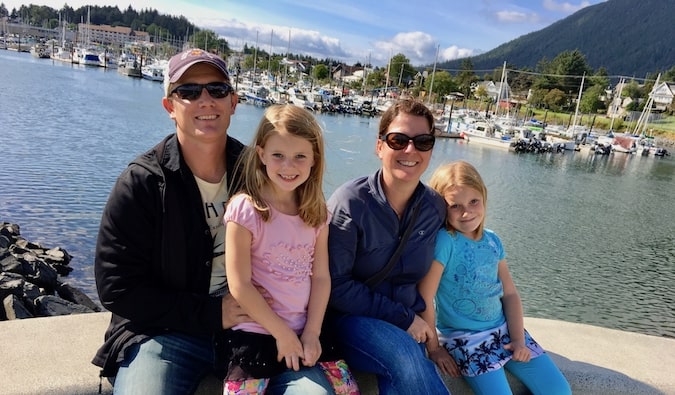
Ever wanted to travel the world with your family? Not sure how to do it on a budget? Not sure what to do about their education? Well, even though I don’t have children, I’m always curious about how families manage to do these things. Maybe one day I’ll have kids and this will become important! So, today, I’m sitting down with Amanda, a community member and writer of children’s books from Idaho. In this interview, Amanda explains how she takes months off to travel with her kids, does it on a budget, and how she continues their education from the road!
Tell us about yourself!
My name is Amanda (but I write as AK Turner). I’m a 40-year-old mother of two from Maryland now based in Idaho. I write full-time, my husband owns a real estate brokerage, and we spend about four months of every year living in other countries.
Before writing full-time, I spent a solid decade in starving-artist mode. I waited tables and cleaned houses. When I became a mother, I was inundated with advice and shocked at how many people think there is only one way to parent (usually their way). I channeled that energy into writing. The result was my first book series, a fairly foul-mouthed, parenting-humor trilogy of This Little Piggy Went to the Liquor Store, Mommy Had a Little Flask, and Hair of the Corn Dog. The books did well and eventually made the New York Times best-seller lists.
As our travel increased, I began writing the Vagabonding with Kids series, travel humor books that chronicle our adventures and mishaps along the way.
How did you get into travel?
Many years ago I first traveled to Russia when I was 15 for an exchange program. I spent four months in Schelkovo, a Moscow suburb, where I attended a Russian high school and lived with a host family. I’ve had the travel bug ever since. I went back four years later for a semester of college at Moscow State University, this time living in a dorm with a Korean roommate. She spoke no English and I spoke no Korean, so it really forced us to work on our Russian skills. She also fed me excellent kimchi.
What made you decide to travel with your kids so often?
After having children, it would have been easy to settle into a routine in one location, but that didn’t feel right as a way of life. It’s not just that I like to travel, but I also see a huge benefit for my children by exposing them to other countries and cultures. The value of that education can’t be quantified. They learn adaptability, gratitude, compassion, languages, and cultural appreciation. I think it’s also important for children to know that there are many different ways of life extending far beyond their suburb.
Another motivator is recognizing the importance of getting out of your comfort zone. Don’t get me wrong: I love comfort. Ordering takeout and bingeing on Netflix sounds fantastic! But I think staying in one place and repeating the same routine year after year breeds stagnation. For both me and my family, I see great value in a varied set of life experiences.
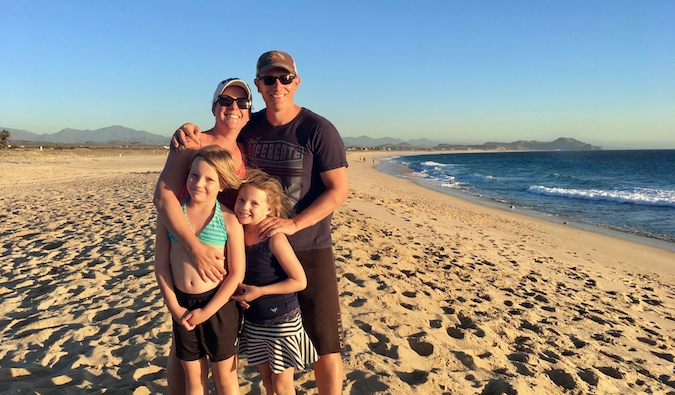
What’s been the biggest lesson so far?
The biggest lesson I’ve learned is that there is no one right way to go about exploring the world. We become hell-bent on proving that we are “travelers” and not “tourists,” as if one term means we are authentic and doing it right, while the other categorizes us as displaced, unadventurous failures. Shedding these falsehoods was freeing. I learned that it’s OK to take the tour and get off the beaten path. Our means and method of travel are whatever work for us at the time, and I’m not out to prove anything. Just because Anthony Bourdain ate goat brains in South Africa doesn’t mean I have to partake.
What advice do you have for people looking to travel with their children?
Children are often more adaptable than adults. We tend to forget that and assume everything will fall apart if they don’t have their daily schedule and routines. They might just surprise you.
I know many parents who fear long, international flights with children. In truth, international flights are far easier than domestic flights. On international flights, you are catered to more, and each seat comes with a screen and an endless library of movies. Our kids love long flights now, because they know they get to indulge in movie marathons. We’re not big on screens and devices, so it ends up being a treat for them.
I’ve met many parents who think they can’t travel with their kids during the school year. At present, we homeschool (whether we are in Idaho or abroad) but for a few years they attended the local public elementary school whenever we were in Boise. There were many times during parent-teacher conferences when I’d tell a teacher we’d be leaving for a few months. Not once did a teacher respond negatively. They were overwhelmingly supportive and often gave us materials to take with us. I think it’s important to know that not only can you buck convention and break the rules but you also might be commended for it and helped along the way.
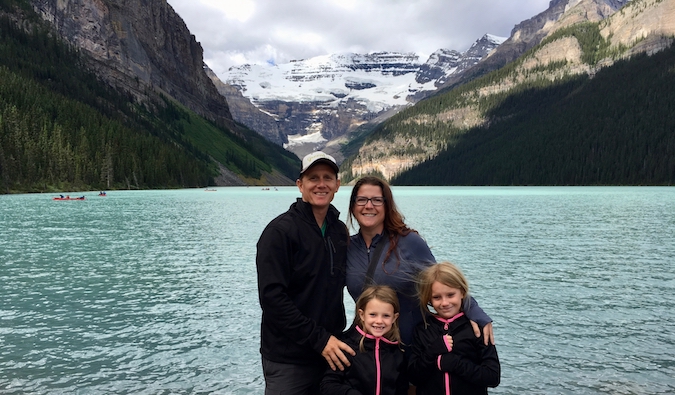
Traveling with kids seems costly. How do you keep your expenses down?
We use three different Alaska Airlines credit cards: one for my husband’s business, one for my business, and one for personal expenses. Regular bills, like telephone charges and monthly subscription services tied to the businesses, are automatically charged to one of these credit cards, so each month we accrue miles. In addition, our daughters each have their own mileage numbers, so they gain miles with every flight we take. The miles accumulate and we redeem them for travel, leaving us with only taxes and incidental fees to pay for out of pocket. We recently booked round-trip flights for our family of four from Boise to Madrid over a six-week span — and paid just over $300.
We use HomeExchange.com to trade homes with people around the globe. Leveraging our home in this manner allows us to eliminate the expense of hotels or long-term rentals. By having a house with a kitchen, as opposed to a hotel room, we save money by preparing our meals instead of eating out all the time.
If we’re unable to set up a home exchange, we’ll rent out our home on VRBO.com. The income from two weeks of renting out our home covers our mortgage payment, plus approximately $600. This overage can then be applied to accommodations in our destination country (in many cases a home or apartment booked through Airbnb — again so that we can have a kitchen, prepare meals, and reduce the costs of eating out).
We often trade vehicles as well as homes, which is an option that can be negotiated on HomeExchange.com. By negating the expenses of accommodations and in-country transportation, we’re able to travel for longer periods of time.
Of course, vehicle exchanges aren’t always an option. We had two stretches of time in Australia when we needed to rent a car. With a little online research, we discovered there are options other than the typical car rental agency. Through DriveMyCar.com.au, which matches up would-be renters with people who have spare wheels and the desire to earn a little extra cash, we were able to rent vehicles much more cheaply than what they would have cost otherwise. We ended up saving over $300 on a month-long car rental by using DriveMyCar.com.au versus what we would have paid to a rental agency.
We also treat long-term travel as life versus vacation. We travel to live in another culture, not vacation there. Meaning we’re looking for experiences, not souvenirs, fancy restaurants, and tourist traps. Our goal is to spend the same or less than we would while living at our home in Idaho. If that means peanut butter and jelly sandwiches so that we can travel the Australian coast in a camper van for a few weeks, bring on the peanut butter and jelly.
What’s been the biggest challenge traveling with your kids?
Adapting our children’s education to a more nomadic lifestyle can be a bit of a puzzle. We use an extensive mix of online education tools, including IXL (worth the $20 monthly subscription for access to K-12 lessons in math, social studies, science, and language arts — cheaper packages available with lesser access), Khan Academy (math tutorials, coding, adult education), YouTube channels (Señor Jordan for basic Spanish, Crash Course Kids for science lessons), Duolingo and Memrise for language learning (for faster, adult-paced language acquisition, I prefer Pimsleur — pricey but effective), Typing.com for keyboarding, and Magic Treehouse and Prodigy for game-based learning. E-readers come in handy, as our daughters read chapter books at such a pace that would prohibit carting along enough material to get them through a trip.
Given that laundry list, one might think our daughters are glued to screens when we travel, but just as much as we use computer-based learning, we also try to employ local culture. An educational assignment might include interviewing a local business owner about the three biggest challenges they face in their community, comparing flora and fauna to that in the US, or learning the meaning behind a country’s flag. Though figuring out how to educate our children on the road has been a challenge, it’s been an enjoyable one.
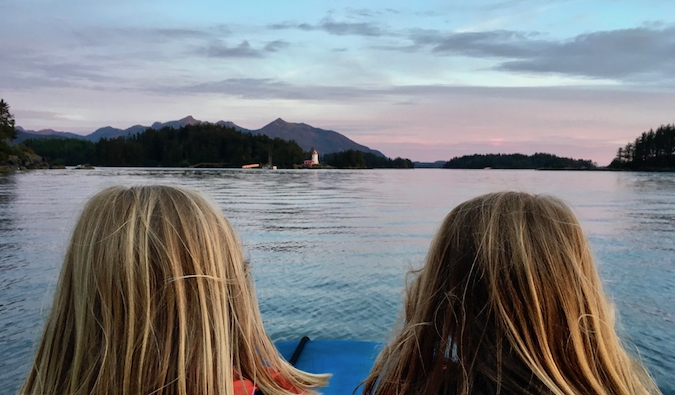
What other challenges are there to consider?
Children are challenging as it is. I don’t find it drastically more challenging by being in a different location. That said, navigating foreign hospitals and emergency rooms can be difficult if there’s a significant language barrier, so I’m always an advocate for having at least a rudimentary knowledge of the language of your host country (it’s also just the considerate and appropriate thing to do). Sign language and patience go a long way when your language proficiency is less than fluent.
The biggest challenge in my family of four is time. We cannot afford to stop working when we travel, so my husband and I have to figure out effective tag-team parenting that allows us the time we need to put into our respective businesses. The rough framework we use (but again, this is a malleable undertaking that changes as needed) is that my husband wakes early and begins work. I deal with the kids in the morning (breakfast, schoolwork). My husband takes over around lunchtime; by that time he’s put in a full workday. This gives me time to write and work on my business. By mid-afternoon, we’re ready to venture out and explore.
Do you meet a lot of other families on the road? Are there any good resources or websites out there for families to connect?
We’ve met many traveling families: in campgrounds, hostels, and simply when exploring a new city. On a remote beach in Mexico we met a family from Virginia with similar plans and children of similar ages to ours. We met up with them a few times, connected on Facebook to stay in touch, and fostered an ongoing pen-pal relationship between our daughters.
Worldschoolers and Multicultural Kid Blogs are both excellent for connecting with other traveling families and discovering new resources for education, travel, and parenting abroad.
Why do you think few families travel like this? More and more seem to do so, but compared to solo travelers, traveling families aren’t as common.
Many parents are afraid of the dangers their children might face in another culture or country. In reality, I think my children are safer when we travel, because I’m more alert and aware of my surroundings. I pay more attention so that I can effectively navigate in unfamiliar territory.
Money holds people back, often because they associate travel with expensive flights and hotel rooms, which doesn’t have to be the case. But by far the biggest thing holding families back is simple convention. Our society, until fairly recently, promoted a monochrome ideal of what family life should be, and this involved staying put during the school year, with a two-week family vacation during the summer. The information age has brought examples of alternatives to this routine to light, and as more positive stories of long-term family travel are heard, more families will take those first steps and take flight.
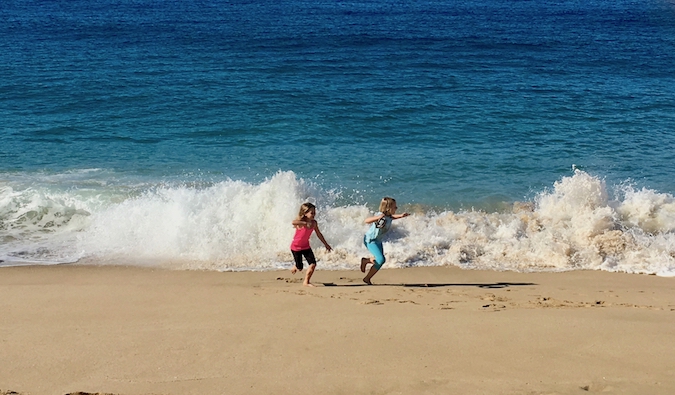
What have been some of your favorite experiences?
Some of my favorite experiences have happened during the Christmas holidays. One year we were in a small town on the Tasman peninsula in Tasmania. We spent Christmas Eve visiting the Port Arthur convict settlement (I have a morbid fascination with facilities of incarceration). Then on Boxing Day [December 26] we visited a Tasmanian devil sanctuary, where they try to save the species from devil facial tumor disease, which has decimated the devil population. I don’t think I’ll ever forget watching a Tasmanian devil eat. Table manners are not their strong suit.
We spent another Christmas in the Amazon, hiking through the jungle and fishing for piranha. A few months later we took our daughters to an all-night Carnaval parade at the Sambadromo in São Paulo. These were great lessons in the adaptability of children. I wasn’t sure how our kids would fare with long jungle hikes, but they rallied.
What’s your number one piece of advice for new travelers?
There will never be a perfect time. It’s better to get out there and learn as you go. You’ll be glad you did.
I know so many people who say they’ll do it someday. And honestly, “someday” is one of the saddest words there is. There isn’t any guarantee of someday. Others have the intention of traveling but they constantly push it back, because they think they need everything planned and perfectly in place, but again, it always comes back to the fact that there is no such thing as the perfect time.
Travel can also be on whatever scale works for you. It doesn’t have to be selling everything you own and traveling around the world for two years. You can start with small, close-to-home trips to test the waters and make sure the world doesn’t end because you left town, then branch out from there. (Hint: the world will not end because you leave town.)
For more travel tips and tales, be sure to check out Amanda’s website. You can also follow her as she adventures around the world with her family on Facebook, Instagram, and Twitter.
P.S. – There are two spots left on my Austin tour for later this month, so if you’re interested, check out the announcement page for all the details!
The post How Amanda Educates Her Kids From the Road appeared first on Nomadic Matt's Travel Site.
No comments:
Post a Comment